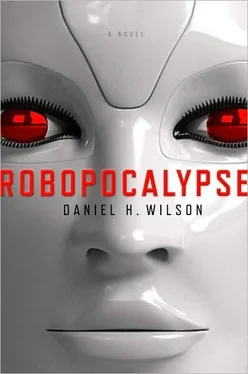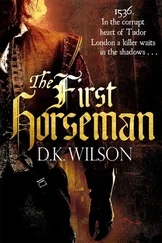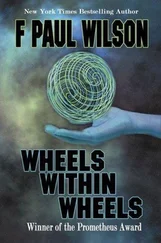Daniel Wilson - Robopocalypse
Здесь есть возможность читать онлайн «Daniel Wilson - Robopocalypse» весь текст электронной книги совершенно бесплатно (целиком полную версию без сокращений). В некоторых случаях можно слушать аудио, скачать через торрент в формате fb2 и присутствует краткое содержание. Город: New York, Год выпуска: 2011, ISBN: 2011, Издательство: Knopf Doubleday Publishing Group, Жанр: Ужасы и Мистика, на английском языке. Описание произведения, (предисловие) а так же отзывы посетителей доступны на портале библиотеки ЛибКат.
- Название:Robopocalypse
- Автор:
- Издательство:Knopf Doubleday Publishing Group
- Жанр:
- Год:2011
- Город:New York
- ISBN:978-0-385-53386-7
- Рейтинг книги:5 / 5. Голосов: 1
-
Избранное:Добавить в избранное
- Отзывы:
-
Ваша оценка:
- 100
- 1
- 2
- 3
- 4
- 5
Robopocalypse: краткое содержание, описание и аннотация
Предлагаем к чтению аннотацию, описание, краткое содержание или предисловие (зависит от того, что написал сам автор книги «Robopocalypse»). Если вы не нашли необходимую информацию о книге — напишите в комментариях, мы постараемся отыскать её.
Archos
assumes control
most are unaware
When the Robot War ignites—at a moment known…
Robopocalypse — читать онлайн бесплатно полную книгу (весь текст) целиком
Ниже представлен текст книги, разбитый по страницам. Система сохранения места последней прочитанной страницы, позволяет с удобством читать онлайн бесплатно книгу «Robopocalypse», без необходимости каждый раз заново искать на чём Вы остановились. Поставьте закладку, и сможете в любой момент перейти на страницу, на которой закончили чтение.
Интервал:
Закладка:
God only knows what she sees down there.
I choose not to look.
But I can hear the confusion. Screams. Explosions. Engines. A couple of times I hear gunfire. People in our building move through the hallway outside, arguing.
Dawn starts a breathless commentary from the window. “The cars, Marcus. The cars are hunting people and there’s nobody in them and, oh my god. Run. No. Please,” she murmurs, half to me and half to herself.
She says the smart cars have come alive. Other vehicles, too. They’re on autopilot and killing people.
Thousands of people.
All of a sudden, Dawn dives away from the window. Our living room shakes and rumbles. A high-pitched whine rips through the air, then trails away. There is a flash of light and a massive thundering noise from outside. Dishes fly off the kitchen counter. Pictures drop from the walls and shatter.
No car alarms go off.
Dawn is my foreman and my girl and tough as liquid nails. Now she sits with her lanky arms wrapped around her knees, tears rolling down her expressionless face. An eighty-seat commuter plane has just streaked over our block and gone down in the neighborhood about a mile down the street near Central Park. The flames now cast a dull reddish light on our living room walls. Outside, black smoke pours into the air.
People aren’t gossiping in the street anymore.
There isn’t another big explosion. It’s a miracle that planes aren’t raining down on the city, considering how many must be lurking up there.
The phones don’t work. The electricity is out. Battery-powered radio just plays static.
Nobody tells us what to do.
I fill the bathtub and sinks and anything I can find with water. I unplug appliances. I duct-tape tinfoil to the windows and pull the shades.
Dawn peels back a corner of the foil and peeks out. As the hours crawl by, she sticks to the couch like a fungus. A red shaft of setting sunlight paints her hazel eyes.
She is staring into hell and I’m not brave enough to join her.
Instead, I decide to check the hallway; there were voices out there earlier. I step out and immediately see Mrs. Henderson from down the hall walk into an open elevator shaft.
It happens quick and silent. I can’t believe it. Not even a scream. The old lady is just there one second and gone the next. It’s got to be a trick or a joke or a misunderstanding.
I run to the elevator, brace my hands, and lean over to make sure of what I just saw. Then I double over and puke on the beige hallway carpet. Tears spill from my eyes. I wipe my mouth on my sleeve and squeeze my eyes shut.
These things don’t seem real. Cars and planes and elevators don’t kill people; they’re just machines. But a small, wise part of me doesn’t give a shit whether this is real or not. It just reacts. I break a sconce off the wall and lay it reverently in front of the yawning gap where the elevator doors should be. It’s my little warning for the next person. My little memorial to Mrs. Henderson.
There are six apartments on my floor. I knock on every door: no answers. I stand in the hallway quietly for fifteen minutes. I hear no voices and no movement.
The place is deserted except for Dawn and me.
The next morning I’m sitting in my easy chair, pretending to sleep and thinking about raiding Mrs. Henderson’s apartment for canned goods when Dawn snaps out of it and finally speaks to me.
The morning light traces two rectangles on the walls where the tape is holding tinfoil against the windows. A brilliant shaft of light from the folded-down corner penetrates the room. It illuminates Dawn’s face: hard and lined and serious.
“We have to leave, Marcus,” she says. “I’ve been thinking about it. We have to go to the country where they can’t use their wheels and the domestics can’t walk. Don’t you see? They’re not designed for the country.”
“Who?” I ask, even though I know damn well.
“The machines, Marcus.”
“It’s some kind of a malfunction, honey, right? I mean machines don’t …” I trail off lamely. I’m not fooling anybody, not even myself.
Dawn crawls over to the easy chair and cradles my cheeks in her rough hands. She speaks to me very slowly and clearly. “Marcus, somehow all the machines are alive. They’re hurting people. Something has gone really wrong. We’ve got to get out of here now while we still can. Nobody is coming to help.”
The fog lifts.
I take her hands in mine and I consider what she’s just said. I really think about getting to the country. Pack bags. Leave the apartment. Walk the streets. Cross the George Washington Bridge to the mainland. Reach the mountains up north. Probably not more than a hundred miles. And then: survive.
Impossible.
“I hear you, Dawn. But we don’t know how to stay alive in the wild. We’ve never even gone camping. Even if we make it out of the city, we’ll starve in the woods.”
“There are others,” she says. “I’ve seen people with bags and backpacks, whole families headed out of town. Some of them must have made it. They’ll take care of us. We’ll all work together.”
“That’s what I’m worried about. There must be millions of people out there. No food. No shelter. Some of them have guns. It’s too dangerous. Hell, Mother Nature has killed more people than machines ever could. We should stick to what we know. We gotta stick to the city.”
“What about them? They’re designed for the city. They can climb stairs, not mountains. Marcus, they can roll through our streets but not through forests. They’re going to get us if we stay here. I’ve seen them down there. Going door to door.”
The information punches me in the belly. Now, a sick feeling spreads through me.
“Door to door?” I ask. “Doing what?”
She doesn’t answer.
I haven’t looked down at the street since it first happened. I spent yesterday staying busy in a protective haze of confusion. Every whimper I heard from Dawn at the window just reinforced my need to stay busy, keep busy, head down, hands moving. Don’t look up, don’t speak, don’t think.
Dawn doesn’t even know about Mrs. Henderson at the bottom of the elevator shaft. Or the other ones with her.
I don’t take a deep breath or count down from three. I march over to the harmless-looking opening in the foil and look. I’m ready for the carnage, ready for the bodies and bombs and burning wreckage. I’m ready for war.
But I’m not ready for what I see.
The streets are empty. Clean. A lot of cars are neatly parked up and down the block, waiting. At 135th and Adam, four newer-model SUVs are parked diagonally across the intersection, head to tail. The inner two cars have a gap between them just big enough for another car to squeeze through, but there’s a car plugging the hole.
Everything seems a little bit off. A pile of clothes is spilled halfway on the curb. A newspaper stand has been shoved over. A golden retriever lopes up the street, leash dragging. The dog stops and sniffs a strange discolored spot on the sidewalk, then pads away with its head hung low.
“Where are the people?” I ask.
Dawn wipes her red-rimmed eyes with the back of her hand. “They clean it up, Marcus. When the cars hurt someone, the walking ones come and drag him away. It’s all so clean.”
“The domestic robots? Like the rich people have? Those are a joke. They can barely walk on those flat feet. They can’t even run.”
“Yeah, I know. They take forever. But they can carry guns. And sometimes the police robots, the bomb-disposal ones on tank treads with claws—sometimes they come. They’re slow, but they’re strong. The garbage trucks …”
“Let me, just let me take a look. We’ll figure this out, okay?”
Читать дальшеИнтервал:
Закладка:
Похожие книги на «Robopocalypse»
Представляем Вашему вниманию похожие книги на «Robopocalypse» списком для выбора. Мы отобрали схожую по названию и смыслу литературу в надежде предоставить читателям больше вариантов отыскать новые, интересные, ещё непрочитанные произведения.
Обсуждение, отзывы о книге «Robopocalypse» и просто собственные мнения читателей. Оставьте ваши комментарии, напишите, что Вы думаете о произведении, его смысле или главных героях. Укажите что конкретно понравилось, а что нет, и почему Вы так считаете.












